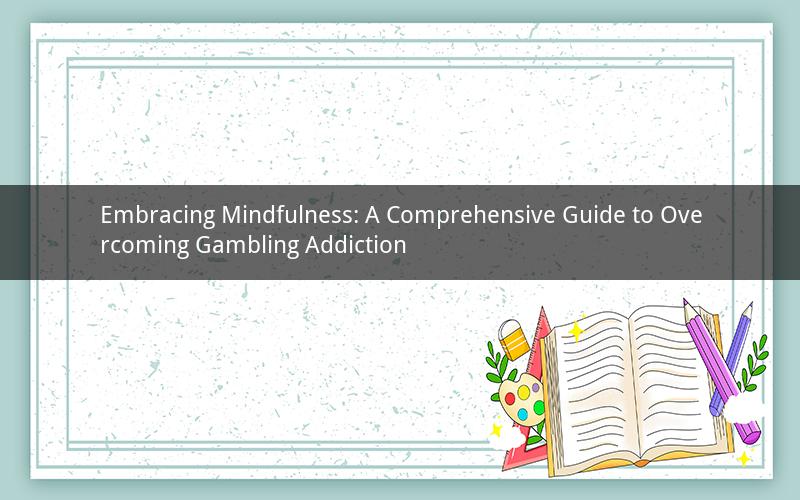
Introduction:
Gambling addiction is a complex issue that affects millions of individuals worldwide. It can lead to severe financial, emotional, and social consequences. However, mindfulness practices have emerged as a promising approach to address and overcome gambling addiction. This article explores various mindfulness techniques that can help individuals develop a healthier relationship with gambling and regain control of their lives.
1. Understanding Mindfulness:
Mindfulness is the practice of being fully present and engaged in the present moment, without judgment. It involves paying attention to our thoughts, emotions, and sensations, and observing them without getting caught up in them. Mindfulness has been proven to reduce stress, improve focus, and enhance emotional regulation.
2. Mindfulness Techniques for Gambling Addiction:
a. Meditation:
Meditation is a fundamental mindfulness practice that involves sitting quietly and focusing on your breath or a specific object. By meditating regularly, individuals can develop a greater awareness of their thoughts and emotions related to gambling. This can help them recognize the triggers that lead to impulsive gambling and respond to them more effectively.
b. Mindful Breathing:
Mindful breathing is a simple yet powerful technique that helps bring individuals back to the present moment. By focusing on their breath, individuals can calm their minds, reduce anxiety, and gain a clearer perspective on their gambling habits. This technique can be particularly useful during moments of temptation or cravings.
c. Body Scan:
The body scan is a mindfulness practice that involves systematically scanning the body from head to toe, paying attention to any sensations, tensions, or discomfort. This practice helps individuals become more aware of their physical sensations and promotes relaxation. By acknowledging and accepting their body's responses, individuals can address the physical aspects of their addiction.
d. Gratitude Practice:
Gratitude is a powerful tool for cultivating positive emotions and reducing the allure of gambling. By practicing gratitude daily, individuals can shift their focus from negative thoughts about their addiction to appreciating the present moment and the positive aspects of their lives. This can help reduce the urge to gamble and foster a healthier mindset.
e. Mindful Journaling:
Mindful journaling involves writing about thoughts, feelings, and experiences in a non-judgmental manner. It allows individuals to express their emotions and gain insight into their gambling patterns. By writing down their thoughts and feelings, individuals can identify triggers, recognize patterns, and develop strategies to cope with cravings.
3. Integrating Mindfulness into Daily Life:
a. Setting Boundaries:
One of the key aspects of overcoming gambling addiction is setting clear boundaries. Mindfulness can help individuals establish healthy limits by becoming more aware of their thoughts, emotions, and behaviors related to gambling. By setting boundaries, individuals can create a structured environment that supports their recovery.
b. Seeking Support:
Mindfulness practices can be enhanced by seeking support from others. Engaging in support groups, attending therapy sessions, or connecting with a sponsor can provide individuals with additional guidance and accountability. By sharing their experiences and receiving support, individuals can gain strength and motivation to overcome their addiction.
c. Cultivating Healthy Habits:
Mindfulness can be integrated into daily life by incorporating healthy habits that promote well-being. This includes regular exercise, adequate sleep, a balanced diet, and engaging in activities that bring joy and fulfillment. By nurturing a holistic approach to self-care, individuals can strengthen their resilience and reduce the allure of gambling.
4. Challenges and Considerations:
a. Relapse:
Relapse is a common challenge in overcoming gambling addiction. Mindfulness can help individuals recognize the signs of relapse and develop strategies to cope with cravings and triggers. By maintaining a practice of mindfulness, individuals can stay grounded and make healthier choices.
b. Patience and Perseverance:
Overcoming gambling addiction is a gradual process that requires patience and perseverance. Mindfulness can provide individuals with the tools to navigate setbacks and maintain a positive mindset. By embracing the journey and celebrating small victories, individuals can stay motivated and committed to their recovery.
5. Questions and Answers:
Question 1: How long does it take to see results from practicing mindfulness for gambling addiction?
Answer: The time it takes to see results varies for each individual. Some may experience immediate benefits, while others may require consistent practice over a longer period. Patience and perseverance are crucial in the recovery process.
Question 2: Can mindfulness completely cure gambling addiction?
Answer: Mindfulness can be a powerful tool in overcoming gambling addiction, but it is not a standalone solution. Combining mindfulness with other therapeutic approaches, such as therapy or support groups, can enhance the effectiveness of treatment. It is important to seek professional help and create a comprehensive recovery plan.
Question 3: Can mindfulness help with the financial consequences of gambling addiction?
Answer: Mindfulness can help individuals develop better financial habits and make more informed decisions. By reducing impulsive behavior and promoting self-awareness, individuals can work towards rebuilding their financial stability. However, addressing the financial consequences may require additional support from financial advisors or credit counseling services.
Question 4: Is mindfulness suitable for everyone struggling with gambling addiction?
Answer: Mindfulness is a versatile tool that can be beneficial for most individuals. However, it may not be suitable for everyone, especially those with severe mental health conditions or those who are unable to engage in mindfulness practices due to physical limitations. It is important to consult with a healthcare professional to determine the most appropriate approach for each individual.
Question 5: Can mindfulness help prevent a relapse in gambling addiction?
Answer: Yes, mindfulness can help prevent relapse by promoting self-awareness, reducing impulsive behavior, and providing individuals with tools to cope with cravings and triggers. By integrating mindfulness into daily life, individuals can enhance their resilience and make healthier choices.